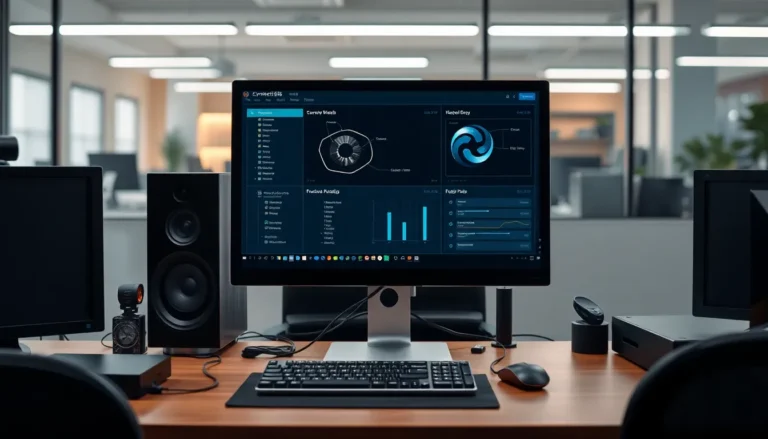Table of Contents
ToggleBiotechnology workshops are becoming essential for anyone looking to dive into the rapidly evolving world of life sciences. These hands-on sessions offer participants the chance to explore cutting-edge techniques and innovative technologies that are shaping industries from healthcare to agriculture. As the demand for skilled professionals in biotechnology rises, workshops provide a unique platform for learning and networking.
Attendees can expect to engage with experts, gain practical experience, and develop valuable skills that can enhance their career prospects. Whether you’re a student, a researcher, or a seasoned professional, biotechnology workshops cater to all levels of expertise, making them a vital resource in today’s competitive job market. With the right workshop, participants can unlock new opportunities and contribute to groundbreaking advancements in science and technology.
Overview of Biotechnology Workshops
Biotechnology workshops are essential for individuals pursuing careers in life sciences. They provide hands-on experience with advanced techniques and technologies relevant to multiple industries.
Purpose and Importance
Biotechnology workshops aim to equip participants with practical skills and updated knowledge in the biotechnology field. Participants engage in real-world applications, enhancing their understanding of cutting-edge advancements. Workshops also foster networking opportunities, allowing attendees to connect with industry professionals and peers. Such interactions can lead to collaborations and mentorships, essential for career growth. With the rapid evolution of biotechnology, these workshops play a crucial role in preparing a skilled workforce capable of driving innovation.
Scope of Topics Covered
Biotechnology workshops encompass a diverse range of topics critical to various sectors. Common subjects include:
- Molecular Biology Techniques: This area covers DNA/RNA manipulation, PCR, and cloning procedures.
- Genetic Engineering: Participants explore gene editing tools, such as CRISPR, and their applications in research and agriculture.
- Bioprocessing: Workshops often include fermentation technology and protein production methods essential for pharmaceuticals.
- Bioinformatics: Attendees learn to analyze biological data using computational tools, contributing to research and development.
- Regulatory Affairs: Understanding the regulatory landscape helps participants navigate compliance challenges in biotechnology products.
These topics ensure participants gain a comprehensive understanding of the biotechnology landscape, preparing them for future challenges and opportunities.
Types of Biotechnology Workshops

Biotechnology workshops come in various formats to suit different audiences and learning preferences. Each type offers unique benefits and focuses on specific areas within biotechnology.
Academic Workshops
Academic workshops emphasize research methodologies and theoretical frameworks in biotechnology. They typically involve university faculty and researchers as instructors. Participants engage in hands-on experiments, discussions on recent advancements, and critical analyses of scientific literature. These workshops cater to students seeking academic enrichment and professionals aiming to deepen their knowledge in specialized fields such as microbiology, genetic engineering, and molecular biology.
Industry-Sponsored Workshops
Industry-sponsored workshops target practical applications and skills that employers seek in the biotechnology field. These sessions are often hosted by biotech companies and feature demonstrations of the latest technologies and equipment. Participants learn about regulatory standards, quality assurance, and bioprocessing techniques relevant to commercial biotechnology. Networking opportunities with industry leaders allow attendees to explore career paths and job opportunities within the sector.
Online vs. In-Person Workshops
Online and in-person workshops present distinct advantages catering to diverse learning styles. Online workshops offer flexibility, allowing participants to engage from any location. They often include virtual laboratories and interactive modules, making advanced topics accessible without travel. In-person workshops promote hands-on experiences and direct interaction with instructors and peers. Both formats complement each other, enabling a broader reach and diverse learning opportunities in biotechnology.
Key Features of Effective Workshops
Effective biotechnology workshops incorporate several critical features to maximize learning and engagement. These elements ensure participants gain valuable skills, knowledge, and connections essential for their professional growth.
Hands-On Experience
Hands-on experience plays a vital role in biotechnology workshops. Participants engage in practical exercises that demonstrate real-world applications of theoretical concepts. Workshops often include laboratory sessions where attendees conduct experiments using modern techniques, reinforcing their understanding of topics like genetic editing, fermentation processes, and molecular analysis. Such immersive experiences elevate the learning process, enabling participants to develop confidence in their technical abilities.
Expert Instructors
Expert instructors enhance the quality of biotechnology workshops. These professionals bring extensive industry experience and academic credentials to the table, offering insights that enrich the learning atmosphere. Instructors often guide participants through intricate procedures, ensuring clarity in complex concepts. Their mentorship helps attendees navigate career opportunities and remain informed about emerging trends and technologies within the biotechnology field.
Networking Opportunities
Networking opportunities are essential features of effective workshops. Participants connect with fellow attendees, instructors, and industry professionals, fostering collaborations and knowledge-sharing. Workshops often facilitate discussions and group activities that promote relationship-building among peers. Establishing connections in the biotechnology community can lead to potential job placements, internships, and valuable mentorships, contributing to long-term career development.
Challenges in Organizing Workshops
Organizing biotechnology workshops presents various challenges that can impact their effectiveness and reach. Addressing these challenges is crucial for maximizing participant satisfaction and ensuring successful outcomes.
Funding and Resources
Funding sources vary, but securing financial support remains a significant hurdle. Organizers often depend on grants, sponsorships, and registration fees to cover costs associated with venues, materials, and instructor fees. Organizations face funding shortages, which can limit the workshop’s scale and quality. Accessing state or federal funding options may provide additional support, while evaluating potential partnerships with companies can enhance resource availability. Allocating resources wisely ensures maximum impact, as costs for equipment and facilities directly affect participant learning experiences.
Participant Engagement
Engaging participants poses ongoing challenges, especially with diverse skill levels and backgrounds. Organizers must tailor content to meet varying expertise while ensuring interactive formats that promote active participation. Incorporating hands-on activities and real-world applications can enhance engagement. Using feedback surveys pre- and post-workshop helps organizers refine their approach and ensure relevance. Establishing a welcoming atmosphere encourages questions and discussions, fostering a cohesive learning environment. Properly balancing theory and practice drives participant interest and satisfaction.
Staying Relevant with Trends
Keeping workshops aligned with emerging trends in biotechnology is essential for maintaining relevance. Regularly monitoring advancements in the field, such as novel techniques or regulatory changes, informs content updates and instructional methods. Collaborating with industry professionals and academic experts helps ensure the latest information is shared. Incorporating case studies or examples of groundbreaking research enhances participants’ learning experiences. Adapting workshop materials based on market demands prepares attendees for real-world challenges, reinforcing the workshop’s value.
Biotechnology workshops play a pivotal role in shaping the future of the life sciences sector. By offering hands-on experiences and access to expert knowledge, they empower participants to navigate the complexities of biotechnology. The blend of practical skills and networking opportunities fosters an environment where innovation thrives.
As the industry evolves, these workshops will remain essential in preparing individuals for emerging challenges and opportunities. Whether through academic or industry-sponsored formats, the commitment to continuous learning ensures that participants stay at the forefront of advancements. Engaging in biotechnology workshops is not just about gaining knowledge; it’s about building a community dedicated to driving progress in science and technology.







